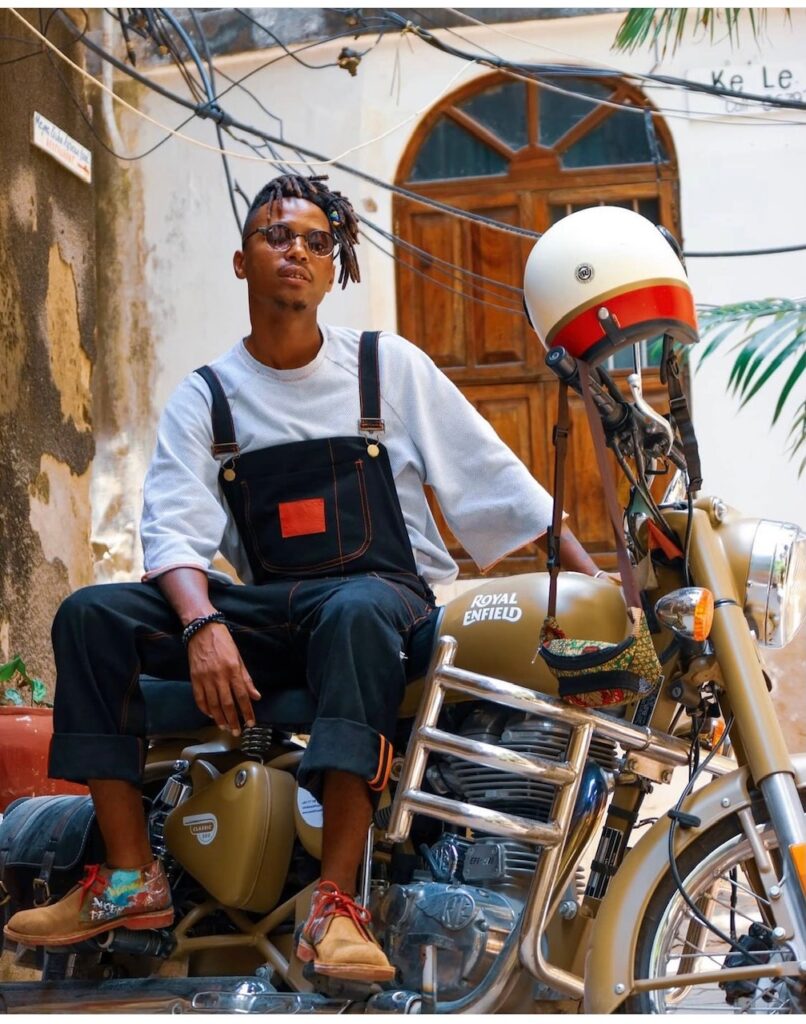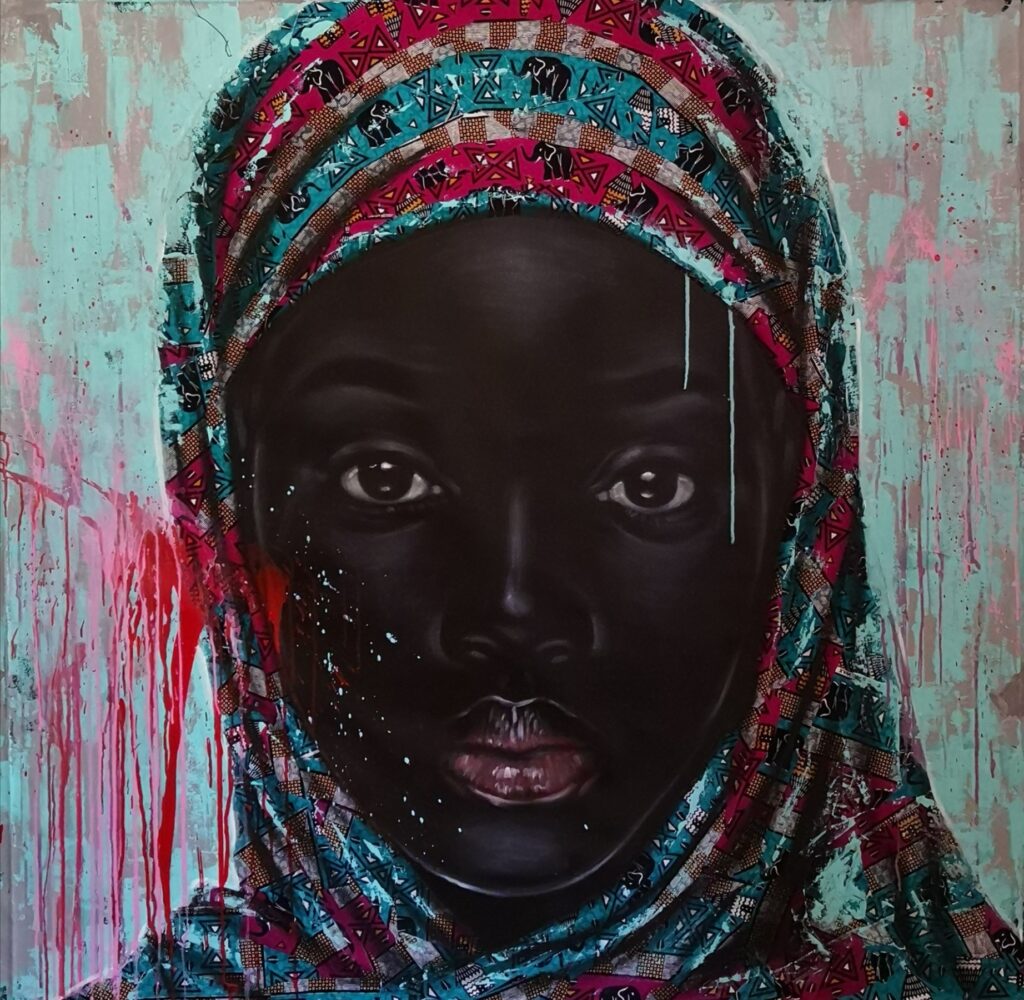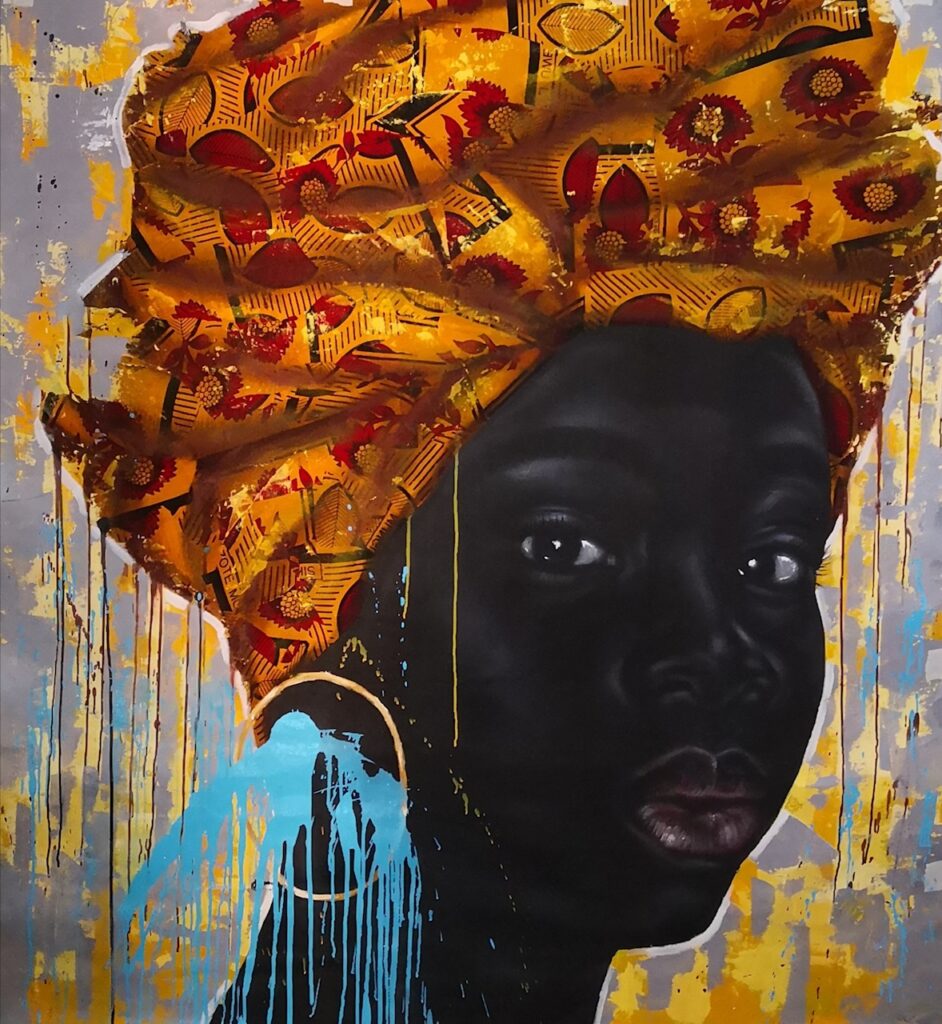
ARTIST REGGIE KHUMALO PRESENTS, RADICAL UBUNTU “ZANZIBAR” 2021
South African artist Reggie Khumalo, endearingly known to his ever growing fan base of art lovers and collectors, as Reggie “The Nomad”, embodies the best of African creatives. Born in South Africa, he has chosen to make the continent of Africa his spiritual passage.
Roaming from border to border, in search of his spiritual identity. Anchored to this land by the love that is expressed through kindness and goodwill.
Regardless of where his bike adventures may land him, he is assured that he will always find a kind heart, and a caring spirit that will embrace him with in the spirit of ubuntu.
I first discovered this incredibly talented artist over a year ago on Instagram. A painting he had posted entitled, “Not Broken, Still Healing” found me in the midst of my own emotional turmoil. It was something about her eyes as they glazed at me that reflected the war that raged in my heart. A quick direct message (DM) to enquire about the piece, led to random exchanges as we shared compliments, exchanged stories around his travels and his work, and before long I had found a brother in this kind soul.
In the last year we have spoken at length about his most recent trip to Unguja, known to the rest of the world as the picturesque East-African island of Zanzibar, his work with the UN World Food Programme and of course, the business of art.
Any conversation with him is met with a genuine desire to share honestly, openly and without reservation. He is a true “ubuntu-ist”, living his life as an expression of love for others, for the continent that gave birth to his ancestors and in gratitude of life!

Med: Acrylic. Size: 1.5m x 1.5m
BM – Your work and travel often find space to collide in the most incredible way. And this has led you to great adventure. How does this approach to creating assist or even facilitate the process?
RK – Adventure definitely assists my work or vice versa, my work is closely tied to my travels, what l experience on the road, what l feel when l meet new people, every minute is an adventure, it’s all-new, I’m on a constant life high. I would say it keeps my mind fresh, consistently learning new ways to express myself.
BM – Everyone’s creative process is so varied. How do you articulate yours?
RK – My Process is simple, it’s my 3 loves, Motorbikes, Travel, and Art. I ride a motorbike to my destinations, and when l get there, l paint. As l ride, the process has begun, the different people l meet, the forever changing landscapes. l absorb as l ride then vomit it all on a canvas when l get to my destinations.
BM – You tend to depict the female so eloquently in your portraits. What is it about the feminine that has captured your imagination?
RK – For me, the feminine has kept their role in the world of nurturing and being the pillar of the community. I’m so moved by her resolve that in the economy of equality, a black woman is at the bottom but she still finds love in her, she still finds a way to adopt another’s child, she is the pillar of the village. She is the outstanding preserver of Ubuntu.
BM – Your paintings really are more portraiture, never really exploring the entire human form. Is there a reason why you’ve chosen this way of expressing, celebrating, and honouring the feminine?
RK – My friends always say they can tell when I’m annoyed or angry, as much as l think I’m not showing it. So l thought there must be something said by the face that we can’t hide, emotions. So with my portraiture l wanted to capture raw emotion and expression of the strength and pain she has felt.

Med: Acyclic. Size: 1.5m x 1.5m
BM – Your first trip from Cape to Cairo, did not go according to plan. And yet this did not derail your journey of bringing Ubuntu through your work. How has this progressed into your work with the UN World Food Programme?
RK – Yes, on my first trip after going through 10 countries, l got sick and had to turn back. At the time l had been diagnosed with stomach cancer, which I later learnt was not the case. I had been misdiagnosed.
On my second trip l managed to ride all the way to Alexandria, where l shipped my motorbike to Greece to continue my trip from there on a later stage. In all honesty, it wasn’t easy the first time l attempted it. l was unknown and didn’t have much money. l had left home with R700. But l found Ubuntu on the road, people took care of me…I had support mainly from women, i.e. Sindi Mabaso-Koyana (mentor), Louisa Mojela, Carol Bouwer and Nosipho Molope to mention a few. This was proof enough that women were holding the torch.
BM – Reggie The Nomad is born in South Africa, with no formal training in art but you’ve found your way in the world of arts. Talking about family ignites a sensitivity for Reggie. Like most children of this land, his is a complicated tale, a history that is marred by decisions not of his making. Like most of us, he is still piecing the fragments of his childhood together but takes comfort in knowing that There is always more room to love. What finally made you to pick up a brush to canvas?
RK – Like most Africans, my ancestors footprints can be traced all over this land. My childhood story takes me from Botswana, to Zimbabwe, to Namibia and back to SA. It has been a journey, and one day we will talk in great detail about it.
So what made me start painting? l have always known how to sketch/ draw from a young age, going on mini road trips with my dad, l would be inspired by what l saw, l would try to capture that. As l grew old l lost it. In my late 20’s l lost the little world l had built and so I took a trip around SA on one of those backpacker buses, literally just capturing my time as l travelled across the country…
Suddenly one day sitting on a hill in the Eastern Cape, looking into the ocean, feeling depleted and emotional about all l had lost, l heard a voice that said, “you need to go. If you trust me, l will take care of the rest.” For the first time it was clear to me, the answers to my life questions were within me. It was my passions, travel, motorbikes, and ART.
So the first trip was basically remembering the Artist Within. Hence my trips are titled “The ride and Artist Within”. I went to learn how to live without, but have the confidence of a man who had never tasted defeat, l had believed l was enough. Then the most beautiful thing happened, the Artist in me was found on the road. The second trip was basically living it.

BM – Your latest exhibition Radical Ubuntu was created at the east-central coastal town of Zanzibar. What is the inspiration for this new collection?
RK – This Series was basically to capture the heart of the Zanzibar, the most humble people after Sudanese l have met. The simplicity of life on the island. l found Ubuntu in its purest form in Zanzibar. How else to capture it then by painting the upholders of it, the women.
BM – You created Radical uBuntu during a global pandemic, has this impacted or influenced your work at all?
RK – Yes, absolutely, in times when each person looks after their own, it seems radical to love, seems radical to share, and seems radical to care. Radical Ubuntu is a new African philosophy that says remember who we were, what we are. Our positive efforts have to be as radical as the negativity we are experiencing. We have to be equal to it, if not more. It’s time to love like we never did before. It’s time to care like we never did before, it’s time to share like we never did before.
BM – Art is a spiritual expression of the artist’s most sacred feelings and thoughts. Were these hard to filter during a pandemic or easier because of the stillness that was imposed upon us?
RK – l have enjoyed this time, l generally don’t like a lot of people in my space. it’s been good in absorbing spaces and the few people. Unfortunately, it has also been limiting to a nomadic soul such as myself
BM – The spirit of uBuntu is central to Africanness. Is this something that you’ve experienced in your travels on the continent?.
RK – Absolutely, everywhere l have travelled to on the continent, yes some countries more than the others, i.e. Sudan/Nubia in Egypt, Zanzibar, Malawi have stood out for me. Funny enough the more developed a country was, the less l have experienced Ubuntu. I would say the more the Rural the better the people. I guess it goes to show the power of Western influences.
I long for the day we live on our terms through our life philosophy of ubuntu. Let Ubuntu be our currency. Let a man be found wealthy because of how rich his heart is.
THE END!!!

CATCH “RADICAL UBUNTU” the latest work by Reggie “The Nomad” Khumalo exhibiting for a limited run at MMArtHouse, Johannesburg. Thereafter the collection makes its way to Berlin, before heading to Roma and possibly Paris later in the year as part of UN World Food Programme collaboration.
Words: B.MASINGA & R. KHUMALO
